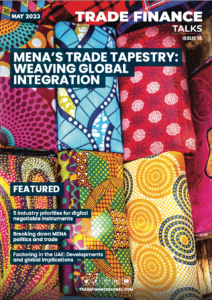Trade has been an integral part of human activity for millennia.
Quite often, trade does not happen directly between the producer of the raw material, the manufacturer and the end user. The supply chain process involved is complex, with each point in the journey ‘adding value’ and potentially adding to the sustainability footprint of the product.
The sustainability footprint may include environmental impacts such as deforestation or loss of a species; it could be a social impact such as the health of a community affected by manufacturing pollution or forced labour; or it could be a combination of these factors.
In 2018, the WTO and UN Environment co-authored a report with an executive summary which begins as follows:
”International trade offers unique opportunities to build a prosperous, climate resilient and environmentally sustainable world…Proactive forward-looking trade approaches can be effective in playing their part to tackling environmental challenges while fostering economic and social prosperity.”

ESG in trade finance
The term ESG (Environmental, Social, and Governance) was first used in a 2004 U.N. report entitled “Who Cares Wins: Connecting Financial Markets to a Changing World”. According to the report, the main target of ESG was “to develop guidelines and recommendations on how to better integrate environmental, social and corporate governance issues in asset management, securities brokerage services and associated research functions.”
On a global scale, nations have increased their collaboration to enhance their collective approach to addressing worldwide environmental issues while also promoting economic growth. These collaborative efforts have resulted in significant policy advancements, including the adoption of the United Nations’ Sendai Framework for Disaster Risk Reduction in 2015, the UN Sustainable Development Goals (SDGs) in 2015 and the Paris Agreement on climate change in November 2016.
ESG in the MENA region
The Middle East and North Africa (MENA) region witnessed a remarkable surge in green and sustainable finance, totalling $24.55 billion in 2021, representing a staggering 532% year-on-year increase, indicating a robust ESG momentum in the region. In 2020, Egypt made history by becoming the first MENA country to issue a sovereign green bond, raising $750 million through a five-year bond.
The regulatory environment differs significantly across countries in MENA, but it is evident that governments are increasingly prioritising ESG-related regulations that span multiple sectors.
For instance, in South Africa, a carbon tax framework mandates certain carbon emitters to pay taxes, while tax incentives are provided to companies adopting environmentally friendly technologies. The launch of the first Code for Responsible Investing in South Africa (CRISA) was an effort to promote the integration of ESG factors into institutional investors’ decision-making, and a follow-up to this Code is already in the works
In collaboration with the Energy Centre in Ghana, UN Environment conducted a study to evaluate the viability of exporting solar energy from Ghana, considering technical, financial, socioeconomic, and environmental factors. The findings revealed that a grid-connected solar power plant with a capacity of 100 MW in Ghana could potentially generate annual energy exports worth $38 million, reduce CO2 emissions by 40,000 tonnes per year, create 3,000 job opportunities, and improve livelihoods for 23,000 individuals living in poverty.
With Gulf Cooperation Council (GCC) nations focusing on diversifying their economies beyond oil, investors are presented with fresh prospects in a wide array of industries, such as renewable energy, infrastructure development, digital technologies, e-commerce, and fintech.
While these sectors may seem diverse, they are all increasingly impacted by a common defining factor: sustainable financing. Investors, however, need reliable data to make informed investment decisions that consider the carbon footprint of their portfolio and the potential contribution to temperature increases. This is currently lacking in corporate greenhouse gas emissions and projections for the short, medium, and long term, as well as on their green revenues and capex.
They also need more and better data on how companies are managing and preparing for climate risks to avoid falling victim to greenwashing by thoroughly researching a company’s ESG practices and seeking out independent, third-party verification of their sustainability claims.
The significant emphasis placed by the Gulf Cooperation Council (GCC) countries on enhancing the quality of life and overall well-being of their citizens is reflected in their national visions, such as Saudi Vision 2030, Oman Vision 2040, and Bahrain Economic Vision 2030, which align with the United Nations’ Sustainable Development Goals (SDGs). Sustainability is recognised as a fundamental principle, integrated into these visions as a key component of their strategic plans for the future.
Collaboration with policymakers has gained increasing significance, not only at the regional level but also globally. The upcoming COP28 in the UAE and the following COP27 in Egypt in 2022 present a fresh opportunity for governments, and public and private sectors in the MENA region to work together in refining national and regional finance frameworks. This collaborative effort aims to enhance clarity, which is crucial for bolstering investor confidence and appetite for sustainable investments.

UAE takes the lead for the ESG push
Having witnessed a 32% YoY growth in its 2022 green and sustainable finance issuing, the UAE continues to build on its ESG momentum MENA-wide.
UAE has dedicated 2023 to sustainability under the theme ‘Today for Tomorrow’, which solidifies the UAE’s commitment to addressing current challenges and promoting sustainable practices at an individual and community level.
Notable examples include the “Net Zero by 2050 Strategic Initiative”, which details the country’s commitment to promoting environmental protection, and its efforts to create thriving communities ideal for living and working.
Universities to involve youth in climate action
Some universities across the UAE have now joined efforts to launch a climate network that supports youth-focused objectives ahead of the upcoming COP28 conference in the UAE later this year. Aimed at encouraging youth engagement in the UAE in the lead-up to COP28, the Universities Climate Network (UCN) is supporting UAE’s goal of creating a more inclusive and participatory environment for young people to be leaders in climate action.
ESG has become the new normal for financial institutions. In the MENA region, it is imperative for the banking sector to align with national and regional frameworks, such as the UAE’s climate goals, as well as global environmental initiatives driven by moral and ethical considerations.
Embracing sustainability in banking practices is a crucial pathway to accelerate the development of sustainable finance, recognising the importance of social responsibility and environmental stewardship.
Environmental fiscal reforms such as offering sustainability incentives (e.g., tax credits, subsidies, or other business incentives) to encourage taxpayers to engage in behaviours and develop technologies that can positively impact the environment are indeed vital.
Just as trade can contribute to improving the environment, so too is a healthy, stable and resilient environment essential for a well-functioning trade.











































